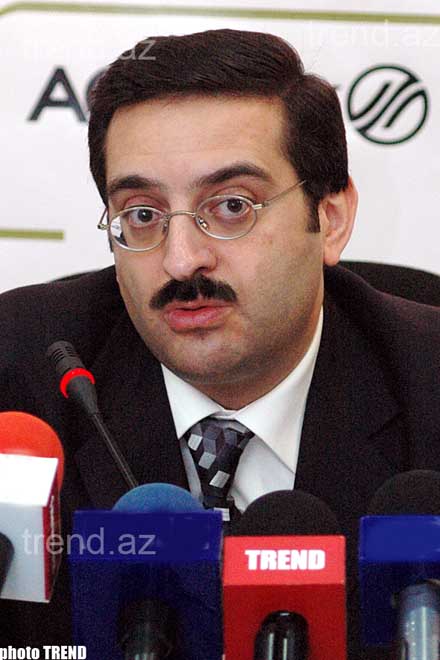Trend interviews Azerbaijani Presidential Center for Strategic Studies (CSS) Director Elkhan Nuriyev
Azerbaijan, Baku, Sept. 7 / Trend, S. Agayeva /
Trend: How do you assess President Dmitry Medvedev's recent visit to Azerbaijan?
Nuriyev: Russian President Dmitry Medvedev's visit to Baku was a significant event. It was already Medvedev's third visit to our country during his presidency, which confirms Azerbaijan's importance for Russia as a regional partner. We saw sufficient evidence of this fact during his most recent visit. Azerbaijan and Russia signed important documents that create a solid foundation for the further development of cooperation between our two countries in the long-term perspective. In particular, we signed a border contract to amend the line of passage running from the meeting point of the Russian, Azerbaijani and Georgian borders to the Caspian Sea.
Two things demonstrate this contract's importance.
First is the fact that it did not take a year to sign the document. An agreement adopted together with it on the rational use and protection of the water resources of the transfrontier Samur River was being prepared for years. The second issue is that Russia is the first country with which Azerbaijan has signed an agreement on its state border. It is clear that reaching an agreement on such a serious matter is very important at a time when many states are facing threats to their territorial integrity, as it visually confirms the presence of a true strategic partnership between Russia and Azerbaijan.
Q: Medvedev expressed Moscow's willingness to fulfill its obligations in the OSCE Minsk Group, and its moral obligations as a neighboring country, by calling upon Armenia and Azerbaijan to intensify the negotiation process surrounding the Nagorno-Karabakh conflict. How do you assess Russia's role in the peaceful settlement of the conflict?
A: During Medvedev's visit, Russia introduced a new element to the settlement of the Karabakh conflict. The president emphasized his country's position regarding Russia's military base in Gumri. He said the principle of the agreement extending the Russian military's stay at the base is "nothing new." He added that Russia's aim is to maintain peace, stability and order in the region, stressing that Moscow is ready to fulfill its obligations within the Minsk Group. In fact, Medvedev's statement on the settlement of the Nagorno-Karabakh conflict gives reason to believe that Russia is not interested in taking steps that could negatively affect its relations with Azerbaijan.
Today, political circles in Moscow assess Azerbaijan's geostrategic role quite clearly, and also understand that the successful development of a pragmatic partnership between our two countries is important for maintaining stability and security in both the Caucasus and the Caspian region.
Azerbaijan and Russia have gained significant positions in both the region and the world, acting as a stabilizing factor in energy and geopolitical development. This, in turn, is another affirmation of our countries' closeness and our commitment to progress and prosperity.
It seems that Russia will soon make additional amendments to its policy toward the conflict's resolution due to our positive, natural factors and our real economic successes, which are directly related to our significant role in the future of geopolitical strategy.
Q: Three important documents were signed during Medvedev's visit to Azerbaijan. Can this be seen as a move to deepen strategic cooperation with Azerbaijan?
A: Medvedev's third visit to Baku reiterated that our strategic partnership continues on the level of an intensive dialogue between our presidents. The economy is an unconditional engine for developing our bilateral relations which lifts many of the subjective repetitions. At the same time, the dynamics of trade and economic cooperation are quite satisfying. If trade turnover in 2004 amounted to $800 million, it comprised more than $1.8 billion in 2009. According to recent data, trade between our two countries amounted to $650.8 million in January-May of this year alone, while Russian exports to Azerbaijan ranked first among other countries, as is tradition, at $407.2 million.
A gratifying factor in our bilateral economic ties is that our relations are developing not only between our countries in the broader format, but also between Azerbaijan and several Russian regions. And, of course, a key point in our long-term partnership is still energy.
As is well known, based on an agreement signed by the heads of our national companies, Gazprom and SOCAR, natural gas exports to Russia reached 500 million cubic meters per year on Jan. 1. An additional agreement envisaging increased purchases of Azerbaijani gas in 2011-2012, signed by the heads of SOCAR and Gazprom, does not only prolong the term of our existing contract. As President Ilham Aliyev said, the document increases Russia's gas purchases fourfold from the initial agreement. From 2011, the amount will increase to 2 billion cubic meters a year, and then surpass the 2 billion mark as of 2012.
After the commencement of the second phase of development of the Shah Deniz gas field, the volume will increase to 3 billion cubic meters of gas and more per year. In fact, Russia may become a primary buyer of our gas. Thus, expert monitoring has shown that the capacity of our gas transportation system to the north is roughly 7.7 billion cubic meters per year.
In light of recent trends in the global economy, which are aimed at great interdependency and integration, as well as our increasing economic and financial capacity, Azerbaijan and Russia are forming a new economic agenda for our bilateral relations today to meet the challenges of the 21st century.






